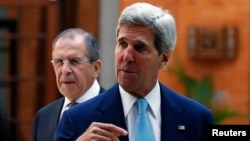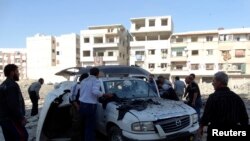JAKARTA —
US Secretary of State John Kerry has applauded Syria for its initial progress in destroying its chemical weapons. Offering some rare praise for Syrian leader Bashar al-Assad, Kerry said he would continue to urge the country to live up to its commitment to destroy its chemical weapons arsenal.
Speaking on the sidelines of the APEC summit in Bali, Indonesia, on Monday, Secretary of State John Kerry said he was determined to see Syria fulfill its promise to destroy its chemical weapons stockpile.
Kerry applauded the Syrian government for complying with the United Nations’ Security Council resolution, which calls for the country to abandon its chemical arsenal.
Describing the progress as a win for multilateral efforts to accomplish a common goal, Kerry was also careful to offer calibrated praise.
"I think it's also credit to the Assad regime for complying rapidly as they are supposed to. Now we hope that will continue. I'm not going to vouch today for what happens months down the road, but it's a good beginning. And we should welcome a good beginning," said Kerry.
Taking the place of U.S. President Barack Obama at the Asia-Pacific economic forum, Kerry and Russian Foreign Minister Sergei Lavrov met to discuss Syria and Iran.
The pair met a day after international monitors began the process of destroying Syria’s 1,000-ton stockpile of chemical weapons.
Foreign Minister Lavrov said Russia would do everything it could to ensure Syria’s chemical weapons were destroyed by mid-2014, as stipulated in the U.N. resolution, and that Damascus follow the agreement without any changes.
Renewed calls for peace conference
Kerry said the two leaders would continue to push Lakhdar Brahimi, the U.N. peace envoy for Syria, to commit to a date for a Syria peace conference.
"But we also agreed that we will meet with Lakhdar Brahimi, and we will urge that the specific date be set within the framework that the envoy has already set, which is somewhere in the second week of November or so. We will urge a date to be set as soon as possible," said Kerry.
The U.N. says it is likely to host the meeting in Geneva this November, but the talks have repeatedly been delayed.
After the meeting with his Russian counterpart Kerry said progress had also been made in respect to talks about Iran’s nuclear program.
"The foreign minister and I did discuss Iran. And we discussed also the discussion that is underway between the United States and Russia on the subject of missile defense. And I think we're in a place now where the next step in that discussion can take place regardless of what happens with respect to Iran," said Kerry.
In an apparent effort to end crippling economic sanctions, newly-elected Iranian President Hassan Rouhani says he is willing to negotiate regarding Iran’s nuclear program.
The next round of talks between Iran and U.N. permanent Security Council member countries, plus Germany, will be held in Geneva in mid-October.
In addition to talks on Syria and Iran, Kerry and Lavrov also signed an agreement on a nuclear threat reduction program. The development builds on an agreement first signed in 1987.
Speaking on the sidelines of the APEC summit in Bali, Indonesia, on Monday, Secretary of State John Kerry said he was determined to see Syria fulfill its promise to destroy its chemical weapons stockpile.
Kerry applauded the Syrian government for complying with the United Nations’ Security Council resolution, which calls for the country to abandon its chemical arsenal.
Describing the progress as a win for multilateral efforts to accomplish a common goal, Kerry was also careful to offer calibrated praise.
"I think it's also credit to the Assad regime for complying rapidly as they are supposed to. Now we hope that will continue. I'm not going to vouch today for what happens months down the road, but it's a good beginning. And we should welcome a good beginning," said Kerry.
Taking the place of U.S. President Barack Obama at the Asia-Pacific economic forum, Kerry and Russian Foreign Minister Sergei Lavrov met to discuss Syria and Iran.
The pair met a day after international monitors began the process of destroying Syria’s 1,000-ton stockpile of chemical weapons.
Foreign Minister Lavrov said Russia would do everything it could to ensure Syria’s chemical weapons were destroyed by mid-2014, as stipulated in the U.N. resolution, and that Damascus follow the agreement without any changes.
Renewed calls for peace conference
Kerry said the two leaders would continue to push Lakhdar Brahimi, the U.N. peace envoy for Syria, to commit to a date for a Syria peace conference.
"But we also agreed that we will meet with Lakhdar Brahimi, and we will urge that the specific date be set within the framework that the envoy has already set, which is somewhere in the second week of November or so. We will urge a date to be set as soon as possible," said Kerry.
The U.N. says it is likely to host the meeting in Geneva this November, but the talks have repeatedly been delayed.
After the meeting with his Russian counterpart Kerry said progress had also been made in respect to talks about Iran’s nuclear program.
"The foreign minister and I did discuss Iran. And we discussed also the discussion that is underway between the United States and Russia on the subject of missile defense. And I think we're in a place now where the next step in that discussion can take place regardless of what happens with respect to Iran," said Kerry.
In an apparent effort to end crippling economic sanctions, newly-elected Iranian President Hassan Rouhani says he is willing to negotiate regarding Iran’s nuclear program.
The next round of talks between Iran and U.N. permanent Security Council member countries, plus Germany, will be held in Geneva in mid-October.
In addition to talks on Syria and Iran, Kerry and Lavrov also signed an agreement on a nuclear threat reduction program. The development builds on an agreement first signed in 1987.





